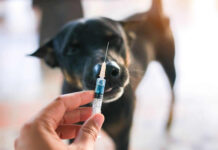In the hospital hallway, the sounds of sick kids filled the air. It was 1964 in Chile, and a young med student named Gilbert Handal was about to enter the measles ward for the first time. The Manuel Arriarán Hospital’s pediatric infectious disease unit was filled with tiny beds, each occupied by a child battling the fever. Some struggled to breathe, while others lay motionless. Parents anxiously waited outside as doctors and nurses hurried through the ward. Saving these kids was all they could think about.
Handal, now 82 years old and a professor at Texas Tech Health in El Paso, recalls the heartbreaking moments from back then. He mentions the time before the measles vaccine came along, and the struggle to save those young lives. Many children didn’t make it. Fast forward to today, and Handal is alarmed by the low vaccination rates in West Texas, where a measles outbreak has affected hundreds and claimed the lives of two school-aged children. The rise in vaccine hesitancy has caused the worst surge of the disease in Texas in over 30 years.
In Chile, Handal worked tirelessly in the pediatric infectious disease unit, caring for children with measles. The place was tense, and the workload was overwhelming. He spent countless hours comforting kids with high fevers, coughs, and the telltale red rash. The situation was so dire that the hospital had to repurpose units to accommodate the sick children. Most of the young patients were infants and toddlers, unaware of the severity of their illness. Some suffered from encephalitis, while others lost their sight and hearing due to complications like conjunctivitis.
The emotional toll on Handal and his team was immense. Losing a child was a devastating experience that stayed with them forever. The numbers were staggering back then, with millions infected annually and hundreds of deaths. Handal vividly recalls the pain of losing young lives and the constant battle against the measles outbreak. But when the vaccine finally arrived in Chile, everything changed. Vaccination rates soared, and the number of cases plummeted, offering hope for a better future.
As Handal reflects on those dark days, he expresses concern over the current outbreak in Texas. The contagious nature of measles poses a significant threat, especially in communities with low immunization rates like West Texas. The fear of regression to a time when measles ran rampant and claimed countless lives is real. Handal stresses the importance of vaccination as a preventive measure to protect individuals and communities from the devastating effects of the disease.
Looking back on his experiences, Handal emphasizes the impact of immunization on public health. The memories of lost children serve as a stark reminder of the importance of vaccination. He urges everyone to take action and ensure that future generations are safeguarded against diseases like measles. The lessons learned from the past should guide us in making informed decisions about our health and well-being. The fight against measles continues, and Handal’s message remains clear: immunize, immunize, immunize to prevent the tragedies of the past from recurring.










